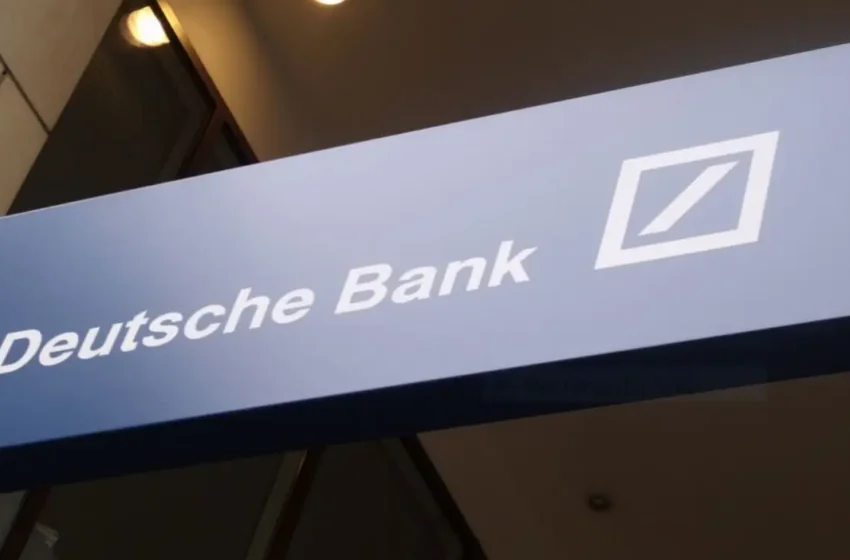Bitcoin Set to Appear on Central Bank Balance Sheets by 2030, Says Deutsche Bank
(Originally posted on : Crypto News – iGaming.org )
A new report from Deutsche Bank suggests that Bitcoin (BTC) is on track to become a formal reserve asset for central banks, sitting alongside gold as a long-term store of value and hedge against inflation. Analysts at the bank say Bitcoin’s evolution mirrors gold’s historical path from a speculative commodity to a trusted safeguard during periods of economic and geopolitical uncertainty.
Good to Know
- Deutsche Bank expects Bitcoin to appear on central bank balance sheets by 2030.
- Analysts cite BTC’s fixed 21 million supply, deep liquidity, and portability as key advantages.
- The bank views Bitcoin and gold as complementary assets, not rivals to the U.S. dollar.
In its report, Deutsche Bank outlines several reasons behind Bitcoin’s growing legitimacy among global institutions. The cryptocurrency’s finite supply, decentralized network, and low correlation to traditional assets make it increasingly appealing to central banks seeking diversification beyond fiat currencies and government bonds.
The report reads:
“Like gold, Bitcoin has a fixed supply (capped at 21mn). This creates disinflationary benefits, meaning that Bitcoin’s value tends to not erode compared to fiat currencies, which lose purchasing power over time due to inflation.”
New players only. Exclusive Welcome Bonus of 350% + 150 Free Spins
Bitcoin’s portability also gives it a clear edge during times of crisis. Unlike gold, which is heavy, costly, and slow to transport, Bitcoin can be moved anywhere almost instantly and at near-zero cost.
The analysts highlighted the practical challenges of gold storage:
“If one were to store either 0.001 BTC or 10,000,000 BTC, the cost would be the same: almost zero. This makes a Bitcoin reserve valuable during times of conflict compared to gold, as moving tonnes of gold out of an invaded country would be very difficult and costly. To put this into perspective, the Bank of England charges external central banks 3.5 pence per night for storing one gold bar, so the cost of storing 400,000 bars for a year would equal ~£5,110,000 in staff, security, maintenance and more.”
Despite its advantages, Deutsche Bank acknowledges that Bitcoin’s volatility remains a key obstacle to full institutional adoption. Still, analysts expect it to stabilize over time, similar to gold’s gradual maturation into a trusted monetary hedge.
New players only. Exclusive Welcome Bonus of 350% + 150 Free Spins
The report also distinguishes between the Bitcoin network, which has never been compromised, and crypto exchanges, which have suffered numerous security breaches. This difference, analysts argue, reinforces Bitcoin’s technological resilience even amid industry setbacks.
Ultimately, the bank concludes that Bitcoin’s role in the financial system will expand meaningfully over the next decade.
“By 2030 we predict that Bitcoin will join gold in many central banks’ official reserve balance sheets… Bitcoin and gold are complementary diversifications to central bank portfolios. As we have underlined, Bitcoin and gold are deemed complementary alternatives to traditional safe-haven reserves due to their low correlation with other asset classes, relatively scarce supply, and use as a hedge against inflation and geopolitical volatility.”







 Bitcoin
Bitcoin  Ethereum
Ethereum  Tether
Tether  XRP
XRP  USDC
USDC  Lido Staked Ether
Lido Staked Ether  TRON
TRON  Dogecoin
Dogecoin  Cardano
Cardano  Figure Heloc
Figure Heloc  Wrapped stETH
Wrapped stETH  Bitcoin Cash
Bitcoin Cash  WhiteBIT Coin
WhiteBIT Coin  Wrapped Bitcoin
Wrapped Bitcoin  Wrapped eETH
Wrapped eETH  USDS
USDS  Chainlink
Chainlink  Binance Bridged USDT (BNB Smart Chain)
Binance Bridged USDT (BNB Smart Chain)  WETH
WETH  Monero
Monero  LEO Token
LEO Token  Zcash
Zcash  Stellar
Stellar  Sui
Sui  Coinbase Wrapped BTC
Coinbase Wrapped BTC  Hyperliquid
Hyperliquid  Litecoin
Litecoin  Ethena USDe
Ethena USDe  Avalanche
Avalanche  Hedera
Hedera  Shiba Inu
Shiba Inu  Canton
Canton  World Liberty Financial
World Liberty Financial  sUSDS
sUSDS  Toncoin
Toncoin  USDT0
USDT0  Dai
Dai  Cronos
Cronos  Uniswap
Uniswap  PayPal USD
PayPal USD  Polkadot
Polkadot  Mantle
Mantle  Ethena Staked USDe
Ethena Staked USDe  USD1
USD1  Rain
Rain  MemeCore
MemeCore  Pepe
Pepe  Bittensor
Bittensor  Aave
Aave  Bitget Token
Bitget Token  OKB
OKB  Tether Gold
Tether Gold  NEAR Protocol
NEAR Protocol  Falcon USD
Falcon USD  Ethereum Classic
Ethereum Classic  Jito Staked SOL
Jito Staked SOL  Ethena
Ethena  Binance-Peg WETH
Binance-Peg WETH  Internet Computer
Internet Computer  Aster
Aster  Pi Network
Pi Network  BlackRock USD Institutional Digital Liquidity Fund
BlackRock USD Institutional Digital Liquidity Fund  Solana
Solana  PAX Gold
PAX Gold  Worldcoin
Worldcoin  Jupiter Perpetuals Liquidity Provider Token
Jupiter Perpetuals Liquidity Provider Token  HTX DAO
HTX DAO  Circle USYC
Circle USYC  Global Dollar
Global Dollar  KuCoin
KuCoin  Binance Staked SOL
Binance Staked SOL  syrupUSDC
syrupUSDC  Sky
Sky  Aptos
Aptos  Pump.fun
Pump.fun  Ondo
Ondo  Ripple USD
Ripple USD  Rocket Pool ETH
Rocket Pool ETH  POL (ex-MATIC)
POL (ex-MATIC)  BFUSD
BFUSD  Wrapped BNB
Wrapped BNB  Binance Bridged USDC (BNB Smart Chain)
Binance Bridged USDC (BNB Smart Chain)  Midnight
Midnight  Render
Render  Arbitrum
Arbitrum  Gate
Gate  Algorand
Algorand  Cosmos Hub
Cosmos Hub  Filecoin
Filecoin  Official Trump
Official Trump  VeChain
VeChain  Function FBTC
Function FBTC  Janus Henderson Anemoy AAA CLO Fund
Janus Henderson Anemoy AAA CLO Fund  Bonk
Bonk